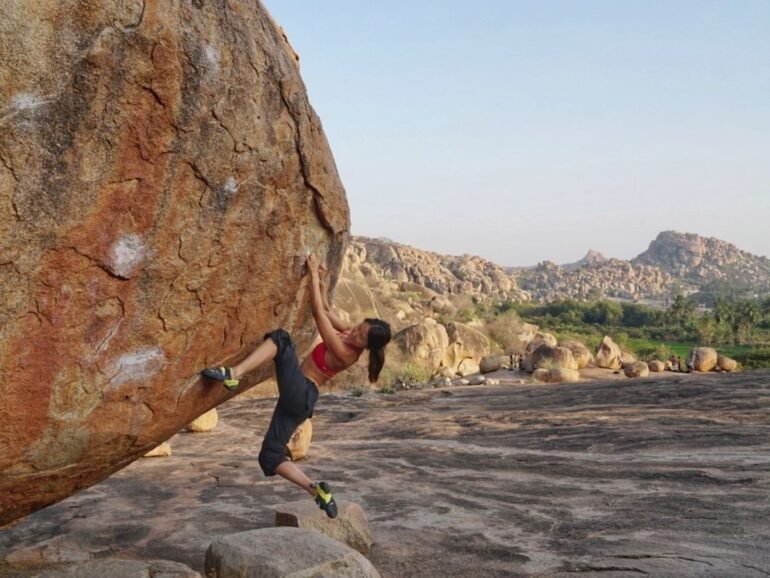Rock climbing enthusiasts can find their ultimate haven in the picturesque Rishimukh Parvata. The region boasts of an array of nature’s best rock-climbing destinations. With its unmatched beauty and challenging terrains, these natural wonders are undoubtedly the top choices for rock climbers across the country. As adventure seekers flock to these breathtaking spots, the district administration and tourism department stand ready to offer their unwavering support, ensuring an exhilarating and unforgettable rock-climbing experience for all.
Following the addition of the Hampi-Anegondi region to the UNESCO World Heritage List, 40% of foreign tourists now come here specifically to learn the sport of rock climbing. Local youth in Hampi have been trained as rock climbing instructors, making a living by teaching visitors about climbing rocks and hills safely. With the recent inclusion of rock climbing in the Olympic World Games, the number of people learning the sport has surged, leading to an increasing number of weekend travelers and tourists in the Hampi-Anegondi area opting to participate in mandatory rock climbing sessions facilitated by these skilled local coaches.
Following the recent action taken by the Hampi Development Authority to clear unauthorized resort-hotels in Hampi Anegondi, tourism in the area has experienced a slowdown. Consequently, fewer weekend travelers and ITBT employees are visiting the region. However, this situation has led to an increase in employment opportunities for many young trainees as rock climbing instructors.
To address the slowdown in tourism and support the livelihood of local rock climbing training, the district administration and tourism department should launch promotional campaigns. Utilizing various platforms, including a dedicated website, they can effectively promote the sport of rock climbing in both domestic and international markets. Highlighting the suitability of Hampi’s Anegondi region for rock climbing will not only attract enthusiasts but also contribute to the overall growth of tourism and the local community.
The Kishkindha-Anjanadi Yegurudda region in the taluk is a popular destination for rock climbing, with historical significance dating back to the Ramayana period. Tourists from across the country are drawn to the majestic rocks that grace the landscape and offer thrilling opportunities for rock climbing. The area’s natural beauty, including hills like Madhuvana, Malyavanta, and Moreya Betta, is admired by nature lovers. A foreign team initiated rock climbing here in 2006 with a focus on safety, leading to the current influx of daily visitors. Local businesses have also emerged to cater to the growing demand for rock climbing supplies and safety gear. This trend not only boosts tourism but also benefits the local economy.
The Tourism Department and District Administration’s negligence caused a significant shift in Anegondi’s culture. Former District Commissioners Naveenraj Singh, P. Sunil Kumar, and Vikas Kishora Suralkar focused on cultural tourism, leading to the removal of the hippie culture. They introduced new attractions like rock climbing in Hanumanahalli Rishimukha mountain range, Sanapura hills, and Sanapura Lake, boosting its popularity among tourists.
As a result, the number of rock climbers increased daily, and many trainees found self-employment opportunities. However, the recent evacuation of resorts and hotels on unofficial grounds resulted in a noticeable decline in tourist numbers, impacting those working in rock climbing training. This has made their livelihoods challenging.
The Tourism Department must actively promote rock climbing in the Anegondi region of Hampi, where this exhilarating sport has thrived for the past three decades. It is crucial to offer extensive training to the local youth, who depend on rock climbing for their livelihoods, ensuring their safety and security.
Boulders specially designed for rock climbing (bolrs) can be found in various locations like Hanumanahalli, Virupapuragaddi Rishimukha, Sanapura Lekh, Jangli, Mallapura, Anegondi, and Vanabhadreshwar hills. The Tourism and Youth Service Sports Department should take charge of promoting rock climbing, utilizing platforms like websites and social media to reach a wider audience. Additionally, organizing training sessions and demonstrations during festivals would further popularize the sport. Shama Pawar, the head of The Kishkindha Trust, advocates for these measures to empower the local community and boost tourism in the area.
Rock climbing, deeply rooted in local history, was successfully practiced by Chhatrapati Shivaji Maharaj and Sangolli Rayanna during their guerilla model attacks. The Kishkindha Yegugudda region and Rishimukh mountain ranges stand out as prime destinations for rock climbers. Over the past two decades, enthusiasts from both domestic and international backgrounds have flocked here to learn the essential skills of rock climbing. European tourists have even documented their experiences of rock climbing, praising the boulders and skilled trainers found in this region.
While rock climbing demands necessary precautions, the Tourism and Youth Service Sports Department alone hasn’t provided sufficient encouragement for this sport. To foster its growth, proper publicity and support for rock climbing trainers are essential, with special camps conducted for local school and college students. Such endeavors require cooperation from the Forest Department. K. Thimmappa, also known as Vikas (Jarry), a prominent rock climbing trainer, advocates for these measures to elevate rock climbing’s prominence and empower the local community.



